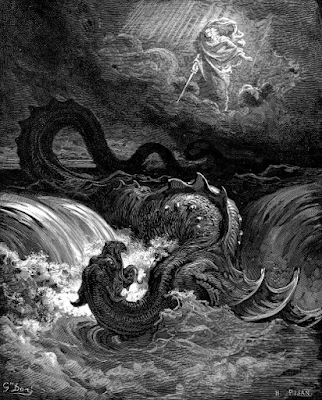It tells us that the Lord will cut up Leviathan with a sword.
This verse, referring to the culmination of God’s judgment on the world, ties in with the judgment mentioned in Isa_26:21. With a sword the Lord will cut up a great serpent called Leviathan. This gliding… coiling serpent is the many-headed sea dragon mentioned in Psa_74:13-14. In Ugaritic literature (of Ugarit, a city-state in North Syria) reference is made to a similar seven-headed creature. Isaiah, though not believing this ancient Semitic myth, simply referred to Leviathan to convey his point (cf. Job_3:8). Leviathan, the twisting monster of the sea, was viewed in Ugaritic literature as an enemy of order in Creation. But the Lord can stop this chaotic state and establish order on the earth and in people’s hearts. When God’s judgment comes in that day, when He slays the wicked at the end of the Tribulation, it will be like His slaying the chaotic dragon Leviathan. -BKCJob 3:8 Let those curse it who curse the day, who are ready to rouse up Leviathan.
Job’s words, May those who curse days curse that day, those who are ready to rouse Leviathan, refers to a custom of enchanters who claimed to make a day unfortunate (to curse it) by raising Leviathan (cf. Job_41:1; Psa_74:14; Psa_104:26; Isa_27:1), a seven-headed sea monster of ancient Near Eastern mythology. When aroused, the dragon would cause an eclipse by swallowing the sun or moon. So if the daytime or nighttime luminary were gone, Job’s birthday would, in a sense, be missing.
 |
| The Destruction of Leviathan, Gustave Dore, 1865 |
Job 41:1-34 This entire chapter is about the Leviathan. The BKC commentary here suggests it could be any number of creatures but probably a crocodile. This is confusing because in the last analysis they asserted it was mythological (?). They also point out that the leviathan and behemoth should not be categorized as dinosaurs as it would incorrectly date Job's lifetime/generation.
The Pulpit commentary points out that the word means "twisting" more than being a proper name; thus it could be describing several types of creatures. General scholarly consensus is that it's a crocodile.
Symbolically, Job uses the Leviathan as a climax of God's control over "chaotic evil."
Psalm 74:13--mentions the Lord crushing the Leviathan's head and it becomes food for creatures. BKC says that Leviathan was a 7-headed mythological creature here, symbolic of Egypt's power.
Psalm 104:26 Psalm 104 is a psalm praising all God has made, the Leviathan here is in company with many of his other creatures and creation, probably a whale swimming in the sea. The idea that "Leviathan" is more of a description of twisting rather than a name helps, though I don't see how a whale twists.
Isaiah 51:9 The reference here is to "Was it not you who cut Rahab in pieces, who pierced the dragon?" The interpretation is that Rahab is "pride" or Egypt and the psalmist is recalling God's delivery of Israelites out of Egypt through the Red Sea. It becomes a type of catch all term for God's enemies.
From Wikipedia:
Sea serpents feature prominently in the mythology of the Ancient Near East.[7] They are attested by the 3rd millennium bce in Sumerian iconography depicting the god Ninurta overcoming a seven-headed serpent. It was common for Near Eastern religions to include a Chaoskampf: a cosmic battle between a sea monster representing the forces of chaos and a creator god or culture hero who imposes order by force.[8] The Babylonian creation myth describes Marduk's defeat of the serpent goddess Tiamat, whose body was used to create the heavens and the earth.[9]

No comments:
Post a Comment